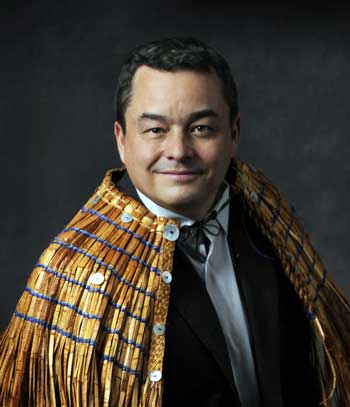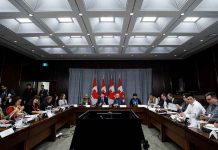

OTTAWA – Leaders Ledger – Together with families of missing and murdered Indigenous women, the Native Women’s Association of Canada (NWAC) and other supporters, I and members of the Assembly of First Nations (AFN) national executive stood to honour missing and murdered Indigenous women at a Sisters In Spirit Vigil in Ottawa on October 4, 2012.
Shawn Atleo – I pledge
As you know, this past July, AFN Chiefs-in-Assembly declared October 4 a national day of remembrance of those impacted by and lost to violence. At the same time, we reiterated calls for a National Public Commission of Inquiry on ending violence against Indigenous women and girls, specifically calling for urgent action by governments and all Canadians to end violence.
AFN declared October 18 a national day of action, encouraging community-based events across the regions and with help from CUPE National we launched a postcard and social media campaign aimed at ending violence among and against Indigenous peoples in Canada. As all action starts with the individual, “I pledge. End violence.” encourages Indigenous peoples and all Canadians to make a personal declaration to live without violence. Thousands of people made this declaration at the July Annual General Assembly, signing a banner to live without violence and achieve safe and secure Indigenous communities. Many are now making their pledge online at http://www.afn.ca/index.php/en/policy-areas/i-pledge.-end-violence where they can also send an e-postcard to Prime Minister Stephen Harper demanding a National Public Commission of Inquiry on violence against Indigenous women and girls.
The call for such an Inquiry has been strongly made by First Nation leadership over many years, and was reiterated again this July at the Annual General Assembly where Chiefs reinforced the need for a National Public Commission of Inquiry to include hearings, a review of police policies and procedures in regard to searches, investigations and communication between police, officials and families, and the examination of the socio-cultural and socio-economic risk factors associated with Indigenous women and girls.
More specifically, a National Public Commission of Inquiry on violence against Indigenous women and girls could:
- ensure an open and transparent examination of the socio-economic, political and historical factors that lead to increased vulnerability;
- examine police practices and protocols with regards to investigations in incidences where Indigenous women are reported missing, communications with families and among and between jurisdictions;
- build on and examine the substantial – and sadly often unimplemented – recommendations made in previous commissions, inquiries, reports and task forces (such as the Royal Commission on Aboriginal Peoples, Manitoba Justice Inquiry, National Aboriginal Women’s Summits, etc.) with a focus on identifying critical barriers to their implementation and strategies to overcome these;
- examine supports, experiences and strategies in urban centres;
- provide special focus on the North and the unique perspectives and experiences of Northern First Nations and Inuit communities;
- review innovative practices and community-based supports in preventing violence and achieving reconciliation.
Earlier this month, representatives of the AFN National Women’s Council attended the 3rd National Aboriginal Women’s Summit in Winnipeg, MB, while I attended the Sounding Our Voices event hosted by the Assembly of Manitoba Chiefs. These two events powerfully highlight the need for an urgent and coordinated response – supported by all levels of government – to end the violence faced by too many Indigenous peoples.
AFN consistently advocates in support of justice for First Nation individuals and families impacted by violence, and for adequate and appropriate health supports and preventative measures to better ensure communities are safe. Ending violence and achieving safety and security for Indigenous women and girls is a pressing priority for First Nations, and we continue to urge commitment by governments and all Canadians for a National Public Commission of Inquiry that would respect First Nation rights, laws and ceremony. All efforts to achieve justice and end violence must be inclusive and respectful of Indigenous women, leaders and families and supportive of community-based wellness plans and justice systems, with specific focus on addressing root causes and increasing prevention.





